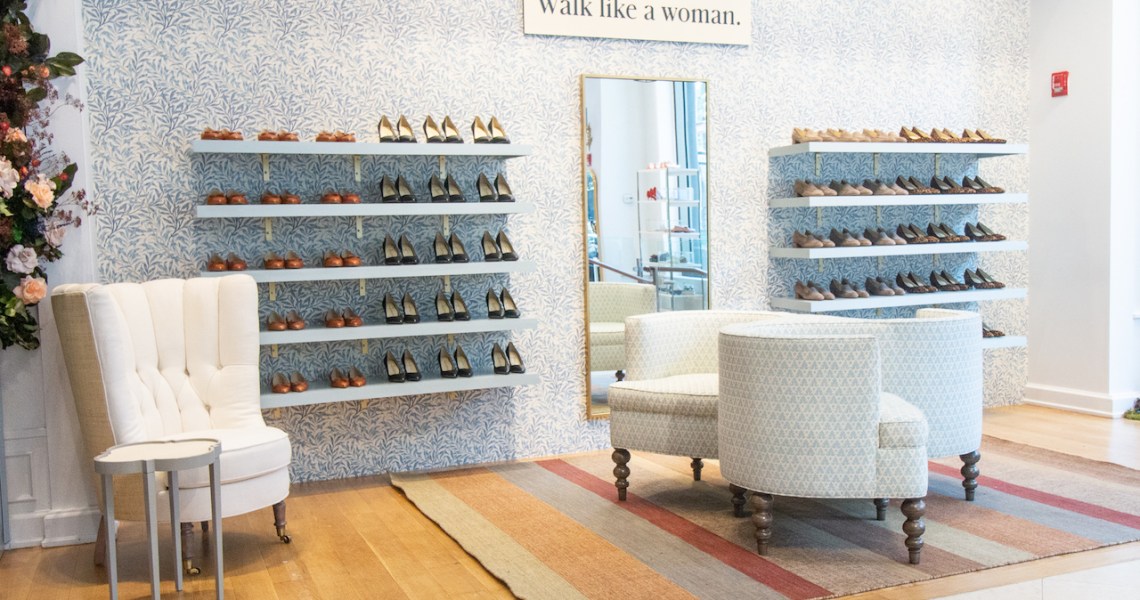While many of the effects of the pandemic have been immediate and visible, there’s been a problem brewing behind the scenes: Nearly every aspect of producing clothes — from sourcing raw materials to manufacturing to shipping finished products — has been growing more difficult and more expensive.
Sarah Flint, founder of her eponymous DTC footwear brand, told Glossy that there have been increases in prices across practically every part of the supply chain. Shipping by sea has gotten more expensive; the ports are backed up, meaning her brand has had to resort to freight and air shipping (which are also becoming more expensive); and prices of raw materials like leather have gone up. Flint said leather prices have seen the heaviest increases, but it’s the accumulation of small increases across the board that is the problem. Soon, Flint said, brands like hers will have to raise their prices to accommodate costs.
Some already have. Jimmy Choo, for example, raised the price of its classic pumps by $100 in the last six months, from $575 to $675. Tamara Mellon increased its hero products by $100, as well, while Aquazzura increased its prices by $50. Christian Louboutin’s pumps jumped from $695 to $745.
“We’re in the beginning phases of analyzing the increased costs and how it will affect our prices,” Flint said. “My biggest questions are: ‘Do we talk to our customer about this, if we have to make price increases?’ ‘How do you message that to the consumer?’ The big guys are not messaging it at all, they’re just doing it. But that doesn’t feel like our brand, which has always been about transparency.”
DTC brands like Sarah Flint can’t be quite as cavalier about increasing the price of goods. The entire pitch of a DTC brand is that there is a direct correlation between its cost of production and the final price of its products. Flint, for example, has always aimed to sell shoes for 40-50% less than typical wholesale luxury brands, with the idea that cutting out the retailer and selling direct will facilitate lower prices.
Currently, Flint sells shoes in the $300-$400 range. The brand targets professional women looking for stylish, but also affordable and comfortable, shoes.
For Flint, raising prices isn’t ideal but likely necessary. While she hasn’t worked out exactly how much they will increase the price, she said her team is having active discussions about how they will present the change to consumers if it needs to happen.
Ad position: web_incontent_pos1
Flint said most price increases are affecting fashion brands’ spring and summer collections. She said it would be dishonest to increase prices now since it isn’t necessary yet, but she’s also worried about waiting to increase prices later.
“People are somewhat understanding right now about complications or delays or paying a small extra Covid tax at a restaurant. But I’m worried that the farther away we get from [the height of the pandemic], the less understanding people will be,” Flint said. “Consumers know that luxury brands have arbitrary markups. They charge insane percentages over what it costs to make [their products]. But I don’t think the consumer really understands the DTC model.”
DTC brand Cuyana is facing similar discussions about how to communicate to customers why prices are what they are. Cuyana’s prices are around $175 for its Classic Tote and $275 for its Systems Tote. The question isn’t necessarily whether they will have to raise prices, but how to explain the increase when it actually happens.
“We don’t want to make our prices inaccessible — that’s important to us. But we are thinking about how to show the customer why the price is what it is,” said Shilpa Shah, co-founder of Cuyana. “It costs more to make material that lasts. Freight is more expensive, materials are more expensive. So we’re looking for ways to educate the consumer around price.”




